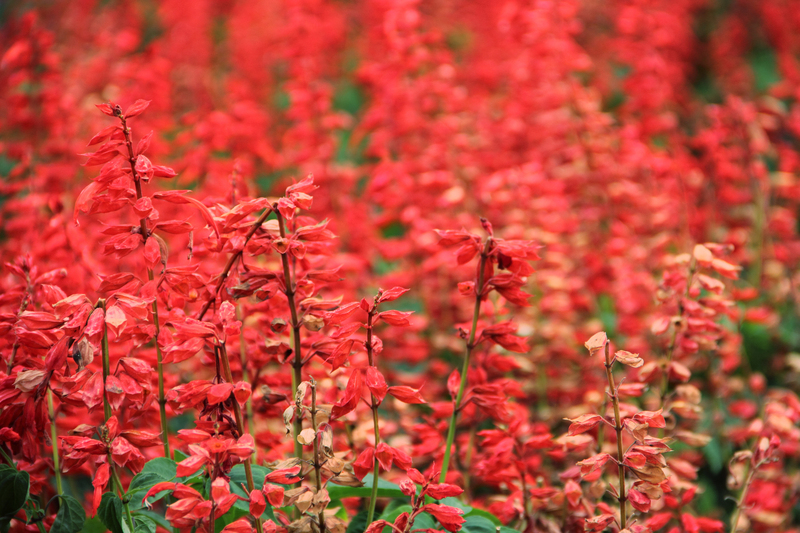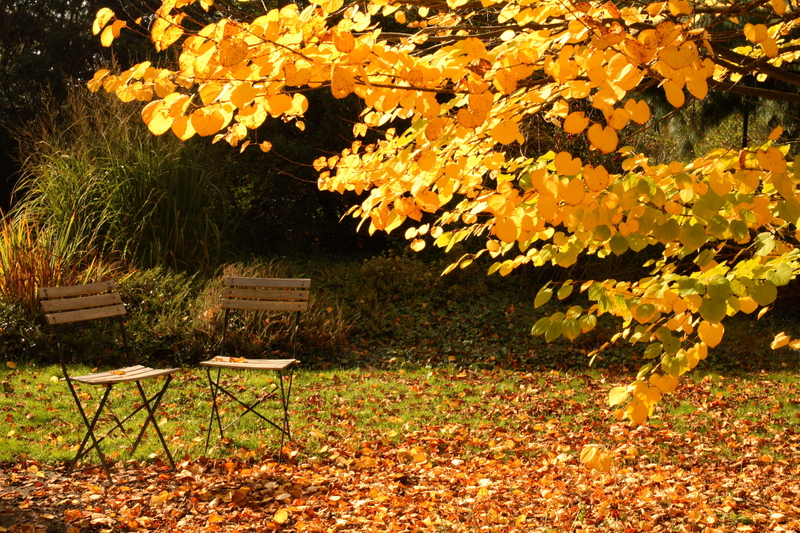Your Guide to Starting a Bountiful Herb Garden
Posted on 07/06/2025
Your Guide to Starting a Bountiful Herb Garden
Herbs have been treasured for centuries for their flavor, fragrance, and medicinal properties. Growing your own herb garden is not only rewarding but also an excellent way to enjoy fresh, organic herbs straight from your backyard or windowsill. Whether you're a beginner or have a green thumb, this guide will help you start a successful and bountiful herb garden, right at home.
Why Grow Your Own Herb Garden?
There are countless benefits to growing your own herbs--from saving money at the grocery store to having access to the freshest ingredients for your kitchen. Herbs are also simple to cultivate and perfect for gardeners of any skill level.
- Freshness: Harvest herbs as you need them, ensuring maximum flavor and nutrition.
- Convenience: Easy access to a variety of herbs right at home.
- Cost-effective: Reduce grocery bills by growing your own herbs from seeds or starter plants.
- Healthy Living: Use herbs to enhance meals with less salt and fat, and enjoy their therapeutic properties.
- Sustainable: Decrease your carbon footprint by sourcing herbs locally from your own herb garden.

Choosing the Right Location
Sunlight Requirements
Most culinary herbs, such as basil, thyme, rosemary, and oregano, thrive in full sun--typically six hours or more of direct sunlight daily. Observe your outdoor space or indoor windowsills to choose the sunniest spots.
Soil Conditions
A bountiful herb garden starts with healthy soil. Herbs prefer well-draining soil, rich in organic matter. If your soil is heavy or clay-like, amending it with compost, sand, or leaf mold will improve drainage and fertility.
Container vs. In-Ground Herb Gardens
- Container Herb Gardens: Ideal for small spaces, balconies, or patios. Choose pots with drainage holes and use high-quality potting mix for best results.
- In-Ground Herb Gardens: Perfect if you have yard space. Design dedicated herb beds or integrate herbs among your vegetables and flowers.
Selecting the Best Herbs for Your Garden
With hundreds of herbs to choose from, it's best to start with those you'll use most often. Here are top picks for beginners in any herb garden:
- Basil: Essential for Italian dishes, pesto, and summer salads.
- Parsley: Versatile and packed with nutrients.
- Mint: Perfect for teas, desserts, and cocktails (but keep it contained--mint spreads vigorously!).
- Rosemary: Aromatic, drought-tolerant, and great for roasted meats and vegetables.
- Cilantro/Coriander: A staple for salsas, curries, and garnishes.
- Thyme: Adds earthy flavor to stews, poultry, and roasted vegetables.
- Chives: Mild onion taste, ideal for salads, eggs, and baked potatoes.
- Dill: Pairs well with fish, potatoes, and pickles.
- Sage: Classic in stuffings, sauces, and herbal teas.
Annual, Biennial, and Perennial Herbs
Herbs can be classified by their life cycles:
- Annuals: (e.g., Basil, Cilantro) Complete their life cycle in one season. Replant each spring for a fresh supply.
- Biennials: (e.g., Parsley) Grow leaves the first year, flower and set seed the second year.
- Perennials: (e.g., Chives, Rosemary, Mint) Return year after year--excellent for a low-maintenance herb garden.
Starting Your Herb Garden: Step-by-Step Instructions
1. Planning the Layout
Sketch out your garden and group herbs by water and sunlight needs. For instance, mediterranean herbs like rosemary, thyme, and sage prefer drier, sunnier spots, while parsley and cilantro enjoy a bit more moisture.
2. Sourcing Seeds and Starter Plants
You can grow herbs from seeds or purchase small starter plants from nurseries or garden centers.
- Seeds are cost-effective but require patience and care in the germination stage.
- Starter plants offer a shortcut to harvesting herbs sooner.
3. Preparing Soil and Containers
- Work compost or organic matter into your soil for fertility.
- If using containers, select ones with proper drainage.
4. Planting Herbs
Follow the specific planting instructions for each herb. Generally:
- Sow seeds: Plant at the depth and spacing recommended on the packet.
- Starter plants: Set into the soil at the same depth as their nursery container. Water immediately after planting.
5. Regular Care and Maintenance
Here's how to keep your herb garden lush and productive:
- Watering: Regular, deep watering is preferred over frequent shallow sips. Over-watering can cause root rot, so ensure good drainage.
- Mulching: Apply organic mulch to retain moisture, suppress weeds, and regulate soil temperature.
- Fertilizing: Most herbs need minimal feeding. Use a balanced organic fertilizer or compost.
- Pruning & Harvesting: Pinch back tips to encourage bushy growth and prevent flowering (bolting)--this keeps herbs flavorful.
Tips for a Thriving and Productive Herb Garden
- Companion Planting: Plant herbs that benefit each other together. For example, basil and tomatoes are excellent companions, enhancing growth and repelling pests.
- Rotate Crops: If growing annuals, rotate planting locations each year to avoid disease buildup.
- Pest Management: Use organic methods like hand-picking, neem oil, or introducing beneficial insects to keep pests at bay.
- Label Your Plants: Use decorative markers to keep track of different herbs.
- Grow Indoors in Winter: Bring potted herbs inside to enjoy fresh flavors year-round.
Growing Herbs in Small Spaces or Indoors
You can cultivate a flourishing herb garden indoors with minimal space. All you need is a sunny windowsill, suitable pots, and proper care.
- Light: South-facing windows are ideal. In low light, supplement with fluorescent or LED grow lights.
- Humidity: Herbs prefer moderate humidity. Mist plants or group them together to maintain moisture.
- Air Circulation: Ensure adequate airflow to prevent fungal diseases.
- Basil
- Mint
- Parsley
- Chives
- Thyme
Harvesting and Storing Your Herbs
For best flavor, harvest herbs in the morning, just after dew has dried but before the sun is intense. Use clean scissors to snip sprigs or leaves, taking care not to remove more than one-third of the plant at a time.
Methods for Preserving Herbs
- Drying: Hang bunches upside down in a cool, well-ventilated place, or use a dehydrator.
- Freezing: Chop herbs and freeze in ice cube trays with olive oil or water for easy use in cooking.
- Herb Infused Oils and Vinegars: Preserve both flavor and aroma in culinary oils and vinegars.
Common Issues and How to Avoid Them
1. Bolting
Basil, cilantro, and dill often bolt or flower in hot weather. To prevent this, pinch back growth regularly and consider planting a second crop in late summer.
2. Overwatering or Poor Drainage
Many herbs are drought-resistant, so overwatering is a common mistake. Always use loose soil, pots with drainage holes, and let soil dry slightly between waterings.
3. Pest Infestations
Aphids, spider mites, and slugs can bother herbs. Wash leaves with a gentle spray or use neem oil for organic control.

Creative Ideas for Your Herb Garden
- Herb Spiral: Create a raised spiral with stones or bricks and plant different herbs at varying heights to optimize sunlight and moisture.
- Vertical Gardens: Use wall-mounted planters or hanging baskets--perfect for small patios and balconies.
- Window Boxes: Grow a variety of culinary herbs right outside your kitchen window for easy harvesting.
- Themed Herb Gardens: Try a pizza garden (basil, oregano, thyme) or a tea garden (mint, lavender, chamomile).
Conclusion: Reap the Rewards of Your Homegrown Herb Paradise
Starting your own herb garden is an immensely enjoyable and practical way to introduce nature into your daily life. With the right planning, care, and a dash of creativity, you can enjoy a flourishing and bountiful herb garden that supplies fresh herbs year-round for the kitchen, medicine cabinet, and beyond.
Ready to dig in? Roll up your sleeves and let your herb gardening adventure begin! Share your progress and ideas with fellow gardeners, and remember--every great dish starts with a sprinkle of homegrown herbs.
Frequently Asked Questions (FAQ) about Starting Herb Gardens
- Q: Can I plant different herbs together?
A: Yes, but group herbs with similar sunlight and water needs. For example, rosemary and thyme both enjoy dry, sunny conditions, while parsley and basil prefer more moisture. - Q: How often should I water my herb garden?
A: Water when the top inch of soil is dry. Container herbs may need more frequent watering than those planted in the ground. - Q: What herbs grow well indoors?
A: Basil, mint, parsley, chives, and thyme are excellent choices for indoor herb gardens. - Q: Do I need fertilizer for my herbs?
A: Most herbs need little fertilization. Use diluted organic fertilizer every 4-6 weeks for a nutrient boost.
Your guide to starting a bountiful herb garden is your first step towards fresh flavors, vibrant aromas, and a healthier, greener lifestyle.
Latest Posts
Transform Your Garden: 3 Crucial Tips for Weed Management
Discovering the Joys of Container Gardening
Blending Gardening and Doggie Adventures

